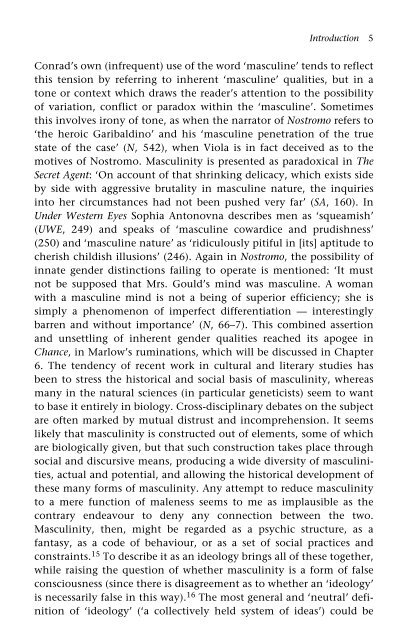Conrad and Masculinity
Conrad and Masculinity
Conrad and Masculinity
Create successful ePaper yourself
Turn your PDF publications into a flip-book with our unique Google optimized e-Paper software.
Introduction 5<br />
<strong>Conrad</strong>’s own (infrequent) use of the word ‘masculine’ tends to reflect<br />
this tension by referring to inherent ‘masculine’ qualities, but in a<br />
tone or context which draws the reader’s attention to the possibility<br />
of variation, conflict or paradox within the ‘masculine’. Sometimes<br />
this involves irony of tone, as when the narrator of Nostromo refers to<br />
‘the heroic Garibaldino’ <strong>and</strong> his ‘masculine penetration of the true<br />
state of the case’ (N, 542), when Viola is in fact deceived as to the<br />
motives of Nostromo. <strong>Masculinity</strong> is presented as paradoxical in The<br />
Secret Agent: ‘On account of that shrinking delicacy, which exists side<br />
by side with aggressive brutality in masculine nature, the inquiries<br />
into her circumstances had not been pushed very far’ (SA, 160). In<br />
Under Western Eyes Sophia Antonovna describes men as ‘squeamish’<br />
(UWE, 249) <strong>and</strong> speaks of ‘masculine cowardice <strong>and</strong> prudishness’<br />
(250) <strong>and</strong> ‘masculine nature’ as ‘ridiculously pitiful in [its] aptitude to<br />
cherish childish illusions’ (246). Again in Nostromo, the possibility of<br />
innate gender distinctions failing to operate is mentioned: ‘It must<br />
not be supposed that Mrs. Gould’s mind was masculine. A woman<br />
with a masculine mind is not a being of superior efficiency; she is<br />
simply a phenomenon of imperfect differentiation — interestingly<br />
barren <strong>and</strong> without importance’ (N, 66–7). This combined assertion<br />
<strong>and</strong> unsettling of inherent gender qualities reached its apogee in<br />
Chance, in Marlow’s ruminations, which will be discussed in Chapter<br />
6. The tendency of recent work in cultural <strong>and</strong> literary studies has<br />
been to stress the historical <strong>and</strong> social basis of masculinity, whereas<br />
many in the natural sciences (in particular geneticists) seem to want<br />
to base it entirely in biology. Cross-disciplinary debates on the subject<br />
are often marked by mutual distrust <strong>and</strong> incomprehension. It seems<br />
likely that masculinity is constructed out of elements, some of which<br />
are biologically given, but that such construction takes place through<br />
social <strong>and</strong> discursive means, producing a wide diversity of masculinities,<br />
actual <strong>and</strong> potential, <strong>and</strong> allowing the historical development of<br />
these many forms of masculinity. Any attempt to reduce masculinity<br />
to a mere function of maleness seems to me as implausible as the<br />
contrary endeavour to deny any connection between the two.<br />
<strong>Masculinity</strong>, then, might be regarded as a psychic structure, as a<br />
fantasy, as a code of behaviour, or as a set of social practices <strong>and</strong><br />
constraints. 15 To describe it as an ideology brings all of these together,<br />
while raising the question of whether masculinity is a form of false<br />
consciousness (since there is disagreement as to whether an ‘ideology’<br />
is necessarily false in this way). 16 The most general <strong>and</strong> ‘neutral’ definition<br />
of ‘ideology’ (‘a collectively held system of ideas’) could be




